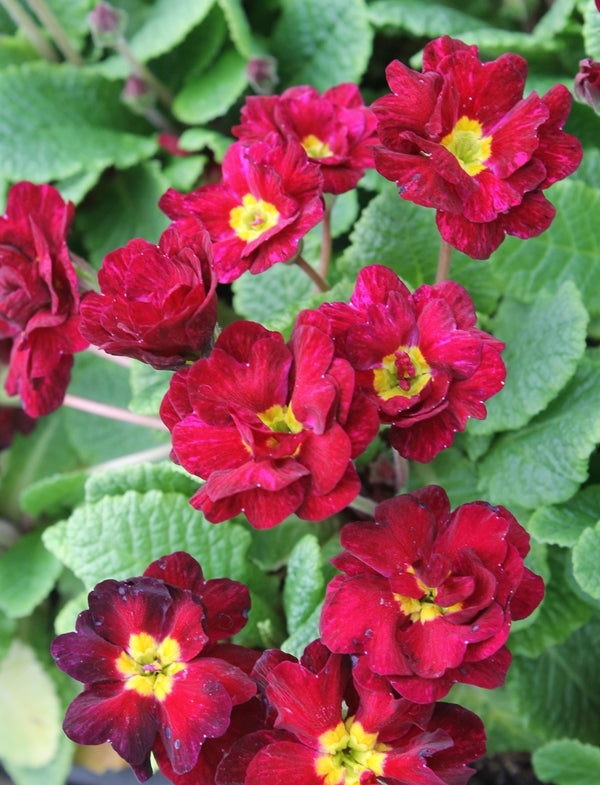Primula vulgaris 'Corporal Baxter'
Corporal Baxter English Primrose
This plant is not currently for sale. This is an archive page preserved for informational use.
Shop Available PrimulaItem #: 3583
Zones: 5a to 8b, at least
Dormancy: Summer, Fall
Height: 6" tall
Culture: Part Sun to Light Shade
Origin: Europe
Pot Size: 3.5" pot (24 fl. oz/0.7 L)
Primula vulgaris 'Corporal Baxter' is a superb, long-lived selection of the English primrose that bears huge clusters of fully double, bright red flowers on short stalks that top the basal rosette of green foliage starting in late March (NC). Primula vulgaris 'Corporal Baxter' is another of the best heat- and drought-tolerant primroses in our trials, having thrived in our woodland garden for over a decade. The clumps go dormant in late summer, re-emerging in late winter after a nice rest. Good, well-drained woodland soils have proven perfect planting locations for Primula 'Corporal Baxter'
Maintenance:
Primula vulgaris, the Common or English Primrose, as well as its hybrid offspring, Primula x polyantha (Primula veris x Primula vulgaris) can succeed in zone 7. It is essential that those growing them select cultivars or seed strains that are known to succeed in their climate. Some common seed strains were developed primarily as florist pot plants and generally don't persist in the ground. It is also essential that the gardener understand that Primula vulgaris and Primula x polyantha are semi-dormant during midsummer. They can look dreadful then, the foliage often yellowing. At this stage it is not uncommon for the foliage to be attacked by spider mites. It is not necessary to do anything at this time except perhaps look the other way, though a good soaking of the plants would be beneficial. The plants, following their own internal clock, will freshen up come early fall. At this point they will produce all new foliage which will then remain fresh until the following summer. This is a good time to remove any remaining foliage from the previous year. Early fall, as they resume growth, is the perfect time to divide well-established clumps. Dig the entire clump up and divide it into smaller pieces, even into individual crowns. Replant them where they are to bloom; water thoroughly and water once or twice a week until they re-establish. Even the small divisions should flower come spring. Old clumps do benefit from this type of division. This is about all of the maintenance that they require.
Growing Conditions:
Primula vulgaris and Primula x polyantha want bright shade, or just a few hours of direct sun. Deciduous shade is better than evergreen shade for these primroses will make use of the winter sun. Moist, well drained soils are best. They will tolerate brief periods of drought but will not thrive in a chronically dry spot.
Garden Value:
The floral display of primroses is quite showy and a delightful addition to the spring garden

-
Related Articles
-
Other Attributes
Genus: Primula
Flower Color: Red
Leaf Color: Green
Bloom Time: Spring
Container Role: Fillers
Garden Themes: Cottage Garden Plants , Fairy Garden Plants , Gnome Gardens

